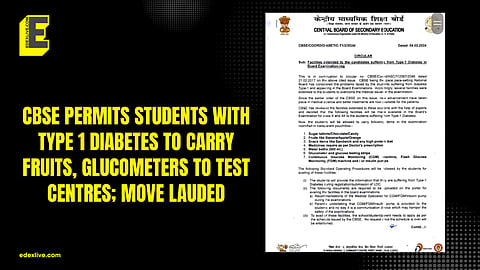

The Central Board of Secondary Education (CBSE) released a circular on February 4, concerning Type 1 diabetes. Students who are living from Type 1 diabetes will be allowed to take their essentials such as insulin pumps, glucometers and so on. The circular stated, “CBSE being the pace-setting National Board has considered the problems faced by the students living from diabetes Type 1 and appearing in the Board Examinations. Accordingly, several facilities were extended to the students to overcome the medical issues in the examination.”
Type 1 diabetes, a lesser-known disease and also known as juvenile diabetes, is a serious health condition. A few symptoms of Type 1 diabetes are the constant need to urinate, feeling parched, and severe weight loss. As a result, it becomes difficult for students to be part of a normal crowd and enroll in schools. One such case is that of Aadya.
A tweet that was trending on social media platform X (previously known as Twitter) on February 8, states the plight of Aadya Agrawal, a six-year-old girl based in Chhattisgarh. She is being denied school admission and a foundation named Blue Circle Diabetes advocates on her behalf. As their tweet received 18.1k views, a chunk of people stepped forward and shared their experience with Type 1 diabetes.
Nupur Lalvani, who is facing Type 1 diabetes herself and the Chief Executive Officer (CEO) of the Blue Circle Diabetes Foundation spoke to EdexLive about the same. Blue Circle Diabetes Foundation, a registered NGO in 2019, is a pan-India foundation that helps patients fight diabetes. They are an online and offline space which spreads awareness about all types of diabetes and are based in Mumbai.
When asked about how schools can educate students and make Type 1 diabetes common knowledge, Nupur’s big suggestion was awareness. She said, “As this is a lesser-known disease, not only in India but also globally, it is vital to spread awareness about the same. The only way to proceed with this is to make the masses aware and start conversations around this topic.”
In addition to this, she also mentioned that if schools can enlighten students about Type 1 diabetes, just like any other regular health problem, then, students who are living from it may find it easier to understand their conditions and that of others too.
Besides that, Nupur, who has been living with Type 1 diabetes for the last 28 years, spoke about how parents can keep track of their children’s health conditions while they are away. She said, “If students wear the Continuous Glucose Monitor (CGM), a device that is worn on the arm and measures blood glucose levels, parents can easily track their ward’s health conditions through an app on their phone. The app is called Blue Circle Diabetes Mobile App.”
Furthermore, when asked about the CBSE circular released a few days ago concerning Type 1 diabetes, she mentioned that it is a vital step towards a better change. “Although it should have been released long back, it will surely bring some positive changes in Type 1 diabetic students.”
On a concluding note, a message that Blue Circle’s CEO shared with people facing Type 1 diabetes is to reach out to a maximum number of people to raise awareness. “If a patient reaches out to someone who can disseminate the information, it helps more people to gain knowledge and step forward to help.”
Provisions in schools
Schools say that in the last decade, the awareness around Type-1 diabetes among children has increased and most private schools in the country now have the required facilities for students living from the disease.
Speaking about these provisions, Father Sunil Fernandes, Principal, St Joseph’s Boys’ High School, Bengaluru, said, “There are certain guidelines about what kind of special requirements these students might have and what provisions schools need to have to fulfil these requirements. For example, they need to have snacks or small meals before the common lunch break. They might need frequent bathroom breaks too. To ensure that the school is inclusive for all, most schools have started providing these facilities, especially since the last 10 years.”
Fernandes added that students are required to be informed about their disease and special requirements at the time of admission along with a medical certificate.
Alister Freese, Principal of Bishop Cotton Boys School, Bengaluru, said that though the school does not have any students enrolled with Type 1 diabetes, the school has basic facilities required for such cases.
“We have an on-site nurse and ambulance for any emergency cases. Though none of our students suffer from the disease in our knowledge, we follow most of the recommended guidelines,” he added.
It may be recalled that in March 2023, the National Commission for Protection of Child Rights (NCPCR) had also written to the Chairman/Secretary Education Boards of all States and Union Territories, stating schools must ensure that children with Type 1 diabetes are provided with proper care and required facilities.
